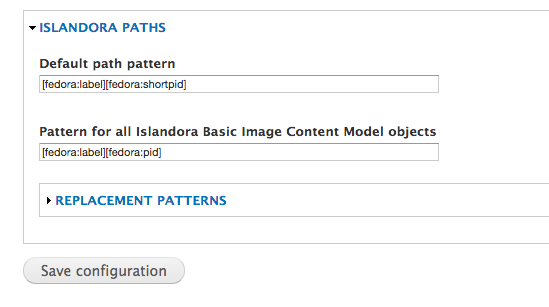Overview
Exposes Islandora objects to the alias-creating tools of Drupal's Pathauto.
Dependencies
Downloads
Release Notes and Downloads
Installation
Install as usual, see this for further information.
Configuration
In Administration » Islandora » Islandora Utility Modules » Pathauto (admin/islandora/tools/islandora-pathauto), configure which content models are subject to Islandora Pathauto:

Configure how Pathauto creates aliases at Administration » Configuration » Search and Metadata » URL Aliases » Patterns (admin/config/search/path/patterns):

Aliases can include the object's pid ([fedora:pid]), the Fedora label ([fedora:label]), the namespace ([fedora:namespace]), and/or the pid without the namespace ([fedora:shortpid]). See the documentation for Pathauto for more information on creating aliases.
FAQ
Q. Why don't the datastreams also follow the alias of the object?
A. With pathauto alone, datastreams are NOT accessible at [object alias]/datastream/DSID. To get this functionality, enable the Drupal moodule Sub-pathauto and configure the maximum depth of sub-paths to be at least 3.
Q. Why is my object still visible at /islandora/object/PID?
A. Drupal aliases don't negate internal paths like islandora/object/PID. If you want the original islandora URLs to resolve (i.e. redirect) to the aliases, then enable Global Redirect.
Q. Where'd the colon in my PID go?
A. By default, Pathauto removes punctuation such as the colon (:) from paths before creating aliases. This will result in PIDs that look like islandora123; if this is undesirable then configure the Pathauto setting under "punctuation" at admin/config/search/path/settings to not remove the colon.
Q. What if I have multiple content models for the same object? Can I give it multiple aliases?
A. No. Multiple aliases for the same object are not supported. All objects should have at most one of their content models enabled for pathauto.


